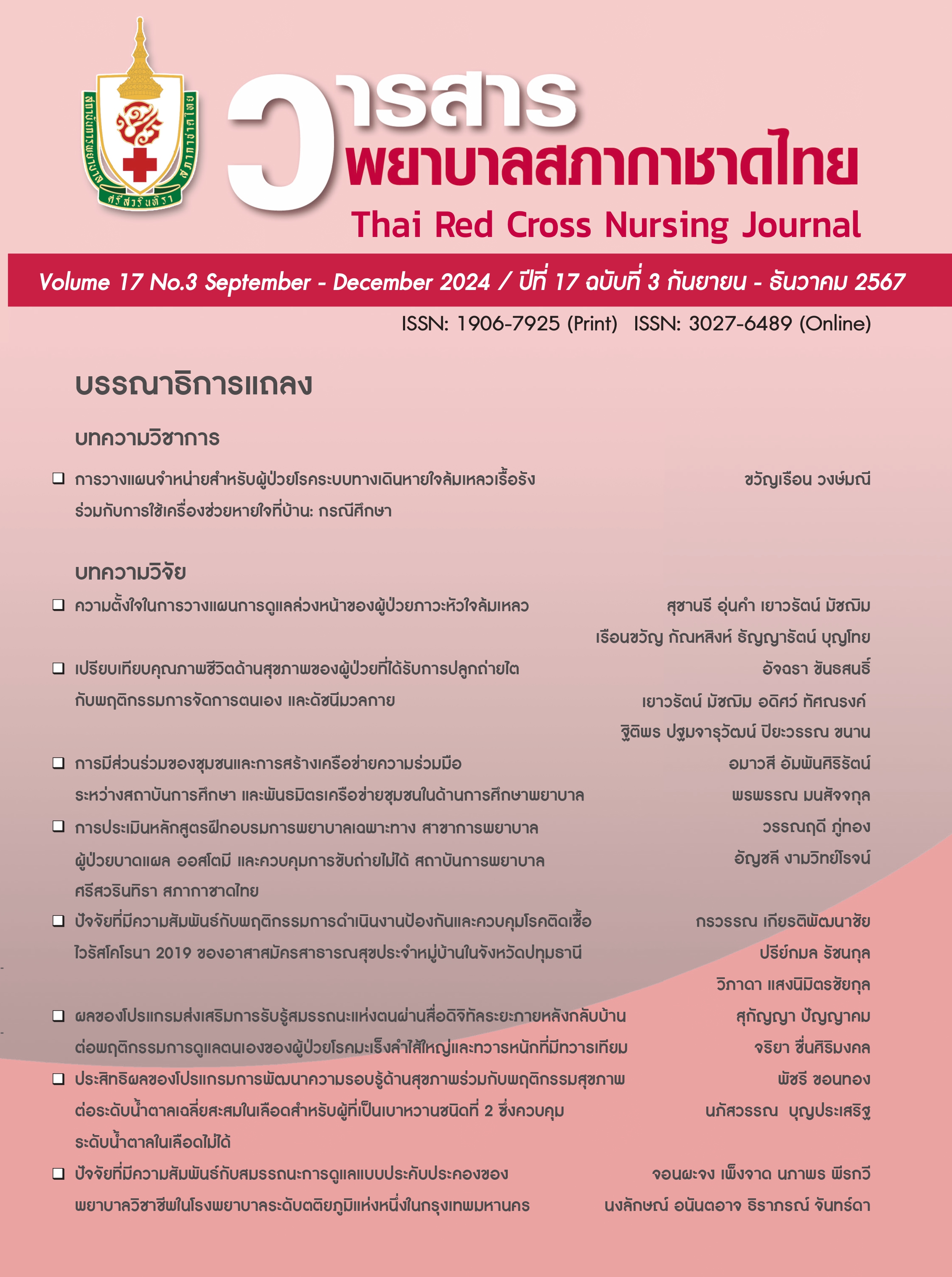Effectiveness of the Health Literacy Development Program and Health Behaviors on HbA1c Levels in Persons with Uncontrolled Type 2 Diabetes Mellitus
Keywords:
uncontrolled type 2 diabetes mellitus patients, health literacy, health behaviors, HbA1Abstract
This study was quasi-experimental research with a two-group pretest-posttest design, aiming to examine the effects of the health literacy and health behavior promotion program on HbA1c levels in persons with uncontrolled type 2 diabetes mellitus through a comparison of HbA1c levels before and after the experiment as well as between the experimental and control groups.
A purposive sampling method was used. Sample size was determined using G*Power software. 30 subjects were assigned to the experimental groups and the other 30 belonged to the control group. The experimental instruments were the programs developed from Nutbeam’s health literacy concept in combination with the 3E 2S health behavior principle of the Health Service Support Department. The experiment took 11 weeks with the activities organized at the subdistrict health promotion hospitals during the first two weeks and follow-up phone correspondenced in place of physical visits from week 3 to week 11. Data collection was conducted using a health literacy assessment form, a health behavior assessment form, and HbA1c level tests. The content validity indices of the questionnaires were found at 1.0 and 0.97 respectively, while the reliability of Cronbach’s alpha coefficients w .91 and .89 respectively. Descriptive statistics and t-tests were adopted to analyze the data.
The results indicated that 1) after the end of the program, the experimental group had significantly lower HbA1c levels (mean = 8.21, SD = 0.87) than they did before participation (mean = 9.44, SD = 1.19), and 2) a between-group comparison revealed that, after the end of the program, the experimental group had lower HbA1c levels (mean = 6.61, SD = 0.87) compared to the control group (mean = 8.69, SD = 1.44) at statistical significance of 0.01 level. Therefore, health literacy programs in combination with health behavior should be implemented among persons with uncontrolled type 2 diabetes mellitus so as to control their blood sugar levels
References
International Diabetes Federation. The 10th edition confirms that diabetes is one of the fastest growing global health emergencies of the 21st century. IDF diabetes atlas [Internet]. 2021 [cited 2024 Dec 24]. Available from: https://www.diabetesatlas.org
Nitiyanant W. It was found that 5.2 million Thai people have diabetes and more than 20 million people are obese [Internet]. 2023 [cited 2024 Dec 24]. Available from: https://www.hfocus.org/content/2023/11/28893 (in Thai)
Department of Disease Control, Ministry of Public Health. Annual report 2022. Bangkok: Aksorn Graphic and Design Publishing; 2022.
Khumthong T, Potisiri W, Kaedumkoeng K. factors influencing health literacy for people at risk of diabete mellitus and hypertension of UthaiThani and Ang Thong. Veridian E-Journal, Science and Technology Silpakorn University 2016;3(6):67-85. (in Thai)
Pethchit R. Self-care behaviors and blood sugar control among patients with diabetes mellitus at Khiensa Hospital, Suratthani Province. The Southern College Network Journal of Nursing and Public Health 2015;2(2):15-28. (in Thai)
Pannark P, Moolsart S, Kaewprom C. The effectiveness of a program for health literacy development of the patients with uncontrolled type 2 diabetes at Bangwua District, Chochoengsao Province. Nursing Journal of The Ministry of Public Health 2017;27(3): 91-106 (in Thai)
Tongkum R. Effects of health literacy promotion on the self-care behaviors of patients with type II diabetes mellitus in Lopburi Province. Singburi Hospital Journal 2022;30(3):86-98. (in Thai)
Saentecha P, Lamluk P. The effectiveness of a program for health literacy development in the patients with type 2 diabetes. Thai Journal of Health Education 2020;43(2):150-64. (in Thai)
Seesun C, Panyasaisophon T. The result of literacy program for type2 diabetic patients. Journal of Health Research and Development Nakhonratchasima Provincial Public Health Office 2020;6(2):155-69. (in Thai)
Sirited P, Suphunnakul P. Health literacy and glycemic control behaviors of the elderly patients with type 2 diabetes. Public Health Policy & Law Journal 2022;8(1):157-71 (in Thai)
Chantha W. Health literacy of self-care behaviors for blood glucose level control in patients with type 2 diabetes, Chainat Province [Thesis]. Pathum Thani: Thammasat University; 2016. (in Thai)
Intarakamhang U. Health literacy: measurement and development. Bangkok: Behavioral Science Research Institute, Srinakharinwirot University; 2017. (in Thai)
Ministry of Public Health, Health Education Division, Department of Health Service Support, Health literacy and Health behavior promoting and assessing [Internet]. 2022 [cited 2020 Jan 25]. Available from: https://skko.moph.go.th/dward/document_file/health_behavior/common_form_upload_file/20230427104744_360301399.pdf (in Thai)
Haera S, Kitreerawutiwong I. Improving health literacy in type 2 diabetes mellitus patients Boromarajonani College of Nursing, Uttaradit Journal 2020;12(1):39-51. (in Thai)
Ausing S. Methakanchanasak N. The effect of functional health literacy promotion teaching package related to rapid decline in kidney function on knowledge and the ability to read and understand health numbers among patients with type 2 diabetic mellitus. Regional Health Promotion Center 9 Journal 2023;17(2):408-22. (in Thai)
Downloads
Published
Issue
Section
License
Copyright (c) 2024 Srisavarindhira Thai Red Cross Institute of Nursing

This work is licensed under a Creative Commons Attribution-NonCommercial-NoDerivatives 4.0 International License.
เนื้อหาบทความหรือข้อคิดเห็นต่างๆ ในวารสารพยาบาลสภากาชาดไทยนี้ เป็นความคิดเห็นของผู้เขียนบทความ ไม่ใช่ความเห็นของกองบรรณาธิการ หรือสถาบันการพยาบาลศรีสวรินทิรา สภากาชาดไทย






